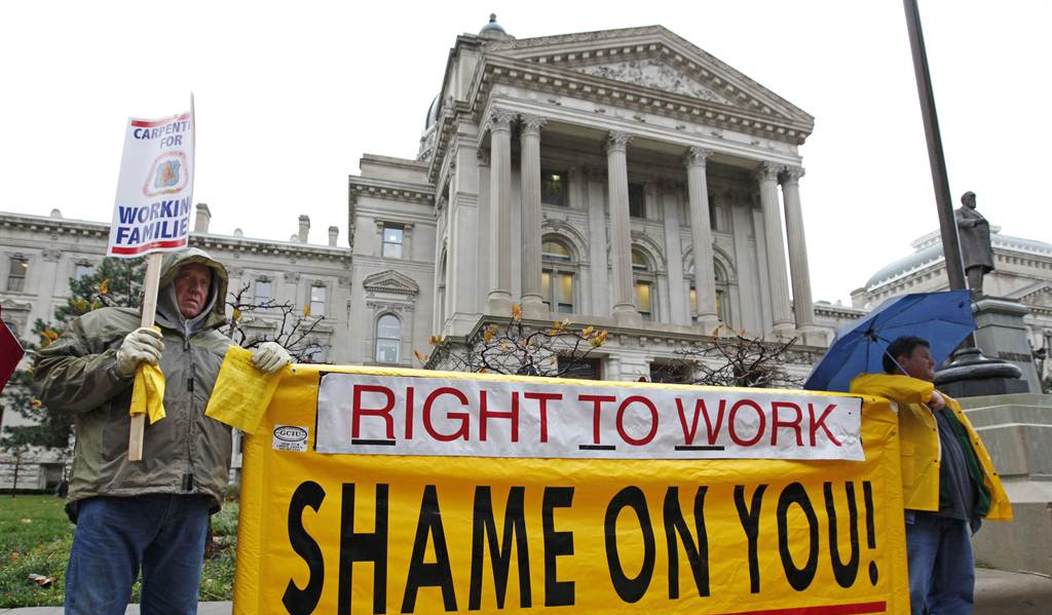Kentucky is unique in that the State House of Representatives is the last bastion of power for Democrats in the South. It’s also the chamber that must sign off on any changes to the state’s election law that prohibits a candidate running for two federal offices simultaneously in the same year. Sen. Rand Paul (R-KY), who is expected to make his official 2016 announcement on April 7, had his hopes for an easy entrance dashed last November when Republicans failed to retake the state House. Also, Kentucky Republicans’ attempt to pass right to work legislation in the Bluegrass State failed again.
It’s not the first time either. For decades, Kentucky Republicans in the state Senate have passed the legislation only to see it die in the House. Now, the counties are taking the helm by passing local right to work laws (via NPR):
This past January, the Republican-led Kentucky Senate did what it does just about every year: It passed a statewide right-to-work bill.Keeping with tradition, when the bill arrived at the Democratic-controlled House, it died.
For decades, Democrats have rejected efforts to allow employees in unionized companies the freedom to choose whether to join a union.
Now, the battle has shifted from the statehouse to individual counties.
The unions are challenging this move, but it’s seen wide bipartisan support. On the legal side, the attorney general has said only state government can pass right to work legislation. But that’s also been challenged by former justices of the Kentucky Supreme Court who argue counties have that power, citing precedent dating back to the 1970s (via Fox News):
"We are not growing as fast as Tennessee. We're not growing as fast as Indiana, Michigan,” Warren County Judge-Executive Mike Buchanon said. "This actually puts us on a level playing field. It enables us to compete with other states."In the last month, five counties have approved ordinances limiting unions – becoming the first counties in the nation to do so. And several more Kentucky counties are expected to follow suit in the next month.
Unions, though, are fighting back. They have filed lawsuits against the counties, claiming they're only interested in bashing unions -- not boosting local economies.
"If you just go after those companies that are paying the lowest wages, you're not going to benefit in the long run because they can always find cheaper wages somewhere," said Eldon Renaud, president of the local UAW in Bowling Green, where the Corvette plant operates.
When businesses are looking to expand, many site-selectors say right-to-work is often one of the key criteria used in finding an ideal location -- meaning Kentucky often doesn’t make the initial list of potential candidates.
County leaders are hoping to change that, and say it’s the reason they've seen almost unanimous support from both Democrats and Republicans in passing these local right-to-work ordinances.
…
State Attorney General Jack Conway, a Democrat who is running for governor, issued a legal opinion last month stating that only state governments, and not local governments, have the authority to pass right-to-work laws.
On the other side are two former justices from Kentucky’s Supreme Court who argue the counties gained that authority in the 1970s, when legislators granted county governments broad powers to pass laws regarding economic development.
Recommended
In a poll conducted by Echelon Strategies, 58 percent of Kentuckians support right to work legislation. Americans for Prosperity’s Kentucky chapter posted the results in their March 19 press release [emphasis mine]:
The poll asked 600 registered voters, "In Kentucky, the state legislature has not passed a right-to-work law. As a result, some local governments have been passing right-to-work laws that apply in their county or city, creating "right-to-work zones." Would you support or oppose your local government passing a right-to-work law?" Of the respondents, 58% support local right-to-work laws, while 35% oppose and 8% are unsure.The poll, conducted from March 16 to 17 by Echelon Insights, has a margin of error of +/- 4%.
"Research confirms what we hear on the ground and that is Kentuckians want their local officials to empower workers, protect their workplace freedom and enact right-to-work laws," said Julia Crigler, state director of Americans for Prosperity Kentucky.
Additionally, the survey probed the party affiliation of respondents to determine if right-to-work enjoyed broad support across party lines.
"The broad base of support for right-to-work across parties was striking - we found 65% of Republicans and 58% of Democrats saying they supported right-to-work," said Kristen Soltis Anderson, principal of Echelon Insights.
Respondents had the most dramatic reaction to this question on workplace freedom, "While workers should have the right to unionize, they should not be forced to join a union or pay dues to one they don't support." Respondents reacted to this statement with 80% agreeing, 16% disagreeing and 4% unsure.
"When we asked voters how they felt about arguments both for and against right-to-work laws, the most powerful message was about worker liberty," Anderson said. "Across the political spectrum, voters think that while workers should have a right to unionize, they shouldn't be required to do so as a condition of employment. Not only did nearly nine out of ten Republicans agree, but so did more than seventy percent of Democrats."
That’s quite the finding to say the least.

























Join the conversation as a VIP Member